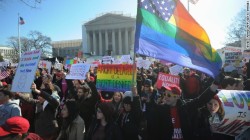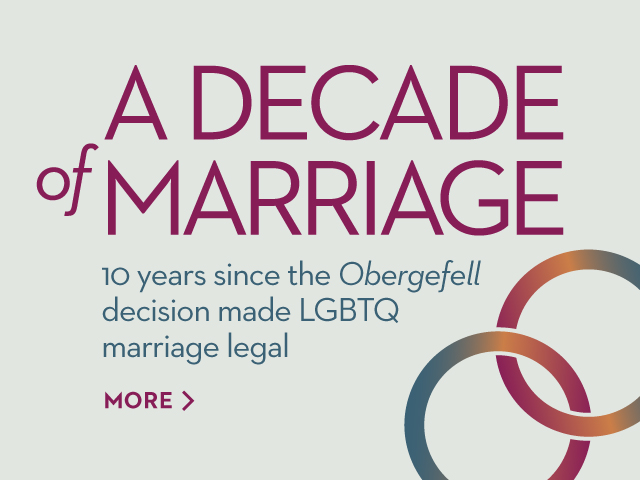
I will get to my impressions of the argument and where I think we might be headed in our Prop 8 saga in a bit. First, though, I want to take a moment just to breathe and acknowledge the history-making nature of this moment. Words that are fully adequate to describe it elude me. I know the words are out there, but they are more likely to be written by historians and scholars, who will look back on these days—and the months and years of work that led up to them—as the most catalytic time in the LGBTQ movement.
I do know that my heart has been racing, my adrenaline pumping, and my stomach flipping since I awoke this morning. Even standing for three hours in near freezing temperatures did nothing to dampen the electricity of this day. Of course, seeing dear colleagues and friends who have been in the trenches of this fight for decades only served to drive home the point: this was a major, unprecedented, almost-beyond-imagining moment. So yes, it bears repeating,WOW.
The argument itself was fascinating. Many others will offer blow-by-blow accounts, so I will just hit some high points here. It appeared right away that a number of the justices are skeptical about whether the proponents of Prop 8 have legal standing—a legal right—to be in court at all. If a majority of the justices find that the proponents do not have standing, then the District Court ruling striking down Prop 8 will be the final word—and same-sex couples will be free to marry in California again.
It is also possible that at least five justices could rule on the merits of Prop 8, finding that it violates the provisions of the federal Constitution, which guarantee that all of us will be treated equally under the law. I think this outcome is less likely than a ruling on standing, but several justices, including Justices Kennedy, Breyer, Sotomayor, Kagan, and Ginsburg all asked questions strongly suggesting that they recognize that excluding same-sex couples from the freedom to marry is unsupported by any legal justification.
There were several gripping moments. At one point Justice Sotomayor asked Charles Cooper, counsel for the Prop 8 proponents, if a state would ever have a legitimate reason to use sexual orientation as a basis for denying gay people rights or benefits, aside from marriage? Cooper’s response: “I do not have anything to offer you in that regard.” In other words: No. This was a damning admission. Of course, Cooper went on to assert that marriage is unique and that permitting same-sex couples to marry would be harmful. Justice Kagan jumped in and asked Cooper to be specific about how allowing same-sex couples to marry would cause harm. Cooper answered that “over time there could be harms.” Justice Kagan pressed, “But what is the actual harm? Where is the cause and effect?” Cooper responded by saying that it was “impossible to know, no one could know the long-term implications.” Justice Kagan, and several other justices, did not seem persuaded by that non-response.
Undeterred, Cooper pressed the argument that marriage equality would create a “genderless institution” that supposedly would “sever the connection of marriage to procreative purposes.” Several of the justices seemed to find this assertion dubious. Justices Kagan, Breyer, and Ginsburg all put forward questions or hypotheticals about couples over 55 or individuals in prison—all of whom can marry. This exercise showed that the argument that marriage is about ensuring responsible procreation is finally gasping its last, feeble breaths.
In short, the arguments of our opponents at the Supreme Court were every bit as fatuous, empty, and absurd as they ever have been—and that seemed obvious to at least a majority of this audience of nine. Justice Scalia was irascible and tried at several points to make Cooper’s argument for him, which, trust me, is a very bad sign if you are the lawyer being thrown such a lifeline. I am not sure we will ever win over Justices Thomas or Alito. But a majority of the Court made comments that suggested they see same-sex couples through a lens of shared humanity—if not full equality.
As we head into the argument about the Defense of Marriage Act (DOMA) tomorrow, I end as I began. This is history, we are witnesses, this is our story, and our moment. Take another breath and say it with me: WOW.
You can listen to audio of the full argument here.










